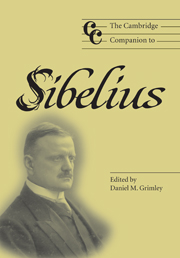Book contents
- Frontmatter
- Introduction
- Part I Forging a voice: perspectives on Sibelius's biography
- Part II Musical works
- Part III Influence and reception
- 10 Sub umbra Sibelii: Sibelius and his successors
- 11 Sibelius and Germany: Wahrhaftigkeit beyond Allnatur
- 12 Sibelius in Britain
- 13 Sibelius and contemporary music
- Part IV Interpreting Sibelius
- Notes
- Select bibliography
- Index of names and works
12 - Sibelius in Britain
from Part III - Influence and reception
Published online by Cambridge University Press: 28 September 2011
- Frontmatter
- Introduction
- Part I Forging a voice: perspectives on Sibelius's biography
- Part II Musical works
- Part III Influence and reception
- 10 Sub umbra Sibelii: Sibelius and his successors
- 11 Sibelius and Germany: Wahrhaftigkeit beyond Allnatur
- 12 Sibelius in Britain
- 13 Sibelius and contemporary music
- Part IV Interpreting Sibelius
- Notes
- Select bibliography
- Index of names and works
Summary
It must have been in 1968 that I found myself sitting with a group of fellow undergraduates in Professor Wilfrid Mellers' first-floor study in the music department of the new University of York. At that time the department was in two elegant former town houses in the centre of the medieval city. It was spring or early summer and shadow-patterns of leaves moved across the walnut-coloured grand piano by the window as Mellers played and talked his way through Tapiola, weaving his own magic spells with words about ecstasy, terror and infinity and echoing with cryptic grandeur the concluding sentence of his piece on Sibelius in Man and his Music: ‘Perhaps we have to “go through” Tapiola in order to live again.’ At the end we listened to the whole piece on record, the mood of enthralled absorption disturbed only by a colleague's insistence that Sibelius should have ended it in B minor. But Mellers had persuaded us that we were listening to an unequivocally ‘great’ work which he had once, he told us, learned to score-read all the way through at the piano.
We were, of course, being introduced to Tapiola little more than ten years after Sibelius's death in 1957 – a point emphasised by the uncorrected tense in Mellers's Man and his Music (first published in 1962): ‘in the thirty years that have elapsed since he wrote Tapiola he seems to have created no music of consequence’. Mellers had clearly devoted himself to the study of Tapiola during the composer’s later, silent years,when Sibelius’s reputation in Britain was still unshaken by the critical implications of a more contemporary ‘new music’ and the pending inrush of American and continental avant-garde experimentation. Devotees of such experimentation in the 1960s would find in Mellers one of their most significant educational gurus, but his pioneering music course at York was defined by its stylistic and historical diversity.
- Type
- Chapter
- Information
- The Cambridge Companion to Sibelius , pp. 182 - 195Publisher: Cambridge University PressPrint publication year: 2004
- 1
- Cited by



